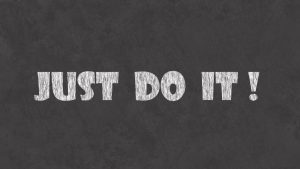Editorial Note
Thank you to our generous sponsors, Sociologists for Women in Society, Center for Equity Education, American Sociological Association’s Section on Sociological Practice & Public Sociology, Hartman Castle Preservation Corporation, Island Acres Resort Motel, Alpha Kappa Delta, Pacific Sociological Association, and the Association for Applied & Clinical Sociology for helping us make Applied Worldwide’s 2024 “Why is Sociology Important?” student essay competition a success!
This essay on the importance of sociology has been published on behalf of Applied Worldwide’s 2024 Global Student Essay Competition. For the 2024 competition, we awarded 16 student essayists across six countries and will be sharing each winning essay in our “Why is Sociology Important?” essay collection.
This sociology essay was written by Fatima Abdullahi Mahmoud, a third year sociology student from Ahmadu Bello University, Zaria, Nigeria and earned a 1st place prize in the competition.
My Path from Sociology to UI/UX Design, Fatima Abdullahi Mahmoud
Sociology was not my first pick while I was applying for Joint Admission and Matriculation Examination to choose my undergraduate degree discipline. I had a strong interest in Psychology, and wanted to study it. Still, I applied to study Sociology, and eventually received an offer to join that field after passing my JAMB. This motivated me to study sociology in depth, and even though sociology functions on a larger scale than psychology, its similarity, and relativity to psychology piqued my attention. The scientific study of social structures, interpersonal interactions, and human behavior is known as sociology. It looks at how people interact and how societies evolve throughout time. Sociologists research social structures, relationships, inequality, change, institutions, and policies, among other facets of social life. They employ a range of research techniques, including questionnaires, fieldwork, observations, social experiments, surveys, case studies, statistical.
How My Love for Sociology Started
When I first learned about the course, its subject matter, and the many founding fathers and their accomplishments, I fell in love with sociology. It was amazing to observe how different people had unique viewpoints and justifications for them, all supported by social science. I also discovered that the primary objectives of sociology are to comprehend social patterns and phenomena, clarify social behaviors, deal with social injustices and inequality, enhance social policies, and promote social change. This provided me with a strong basis on which to build my future academic endeavors and my ideas for changing my community, which led to my eventual interest in graphic design. The process of developing visual communications and solutions that use font, color, and visual aspects to convey ideas is known as graphic design. The objective is to make an emotional connection with the audience, convey a brand’s identity, or successfully convey key messages. A logo, branding, publication, environmental, user interface (UI) and user experience (UX), advertising, and marketing design are some examples of the various types of graphic design.
Sociology is Helping Me To Improve My UI/UX Design Skills
After learning about UX design during my second year, I started honing my design abilities in addition to Sociology. ‘User Experience Design,’ or UX design for short, is the process of developing goods or services that offer significant user experiences. This includes components of product development like branding, usability, function, and design. In the context of websites or apps, UX design is primarily concerned with how people find a digital product to be equitable, helpful, pleasant, and easy to use. When I studied UX design classes in my second year, I discovered that the research techniques were quite similar to those of sociology. I was able to understand the issues more easily as a result. At Ahmadu Bello University in Zaria, I eventually rose to the position of Deputy Graphic and Design Lead at Ahmadu Bello University Developers Student Club (ABUdevs), where I assisted students in navigating the design world while including a dash of sociological knowledge. I founded Greenbubble Design Studio, volunteered UI/UX designer at Bravpuls Technologies, volunteered UI/UX design Facilitator at She Code Africa × Women Tech Makers Kaduna.
The Point Where Sociology and Design Collide
Numerous traits that sociology and design have in common allow them to be complementary disciplines that may collaborate to solve challenging social issues. The comprehension of human experiences, behaviors, and wants is the main goal of sociology and design. While designers work to develop solutions that satisfy human needs and enhance user experiences, sociologists investigate how people interact with one another and their social contexts. They take into account the environmental, cultural, and social circumstances. While designers take into account consumers’ physical abilities as well as their settings, cultures, and social norms, sociologists investigate how social contexts impact behavior.
In order to gain knowledge and make decisions, both sociology and design require analyzing data, information, patterns, systems, and trends. While designers examine user research, behavior, and feedback to build user-friendly designs, sociologists examine social data to spot trends. Both seek to improve human experiences and deal with real-world problems. While designers employ creative thinking to create solutions that satisfy consumer demands, sociologists use innovative research approaches to study social phenomena. Both entail exchanging ideas, forming connections, and working with a variety of stakeholders, teams, and communities. While designers work with clients and team members, sociologists frequently cooperate with legislators and community members, and to test presumptions, query conventions, and provide novel answers, both disciplines necessitate critical thinking. While designers question design conventions, sociologists analyze social structures and power relations through critical thinking.
Applying Sociological Imagination to My Designs
C. Wright Mills first used the term “sociological imagination” in the 1950s to describe the capacity to relate personal experiences to larger social structures and historical contexts. In order to provide successful designs for clients, I apply sociological imagination in UX design by: Recognizing the target market, industry, and cultural background of my client: This enables me to produce designs that are distinctive from those of my rivals and align with my ideals. Sociology helps me to better understand my clients, the markets and audiences by effectively and compellingly carrying out research findings. And this helps in creating solutions that are considerate and inclusive; a research that guarantees that products are not offensive and are sensitive to users’ sensibilities.
The design sociology methodologies that I am interested in provide sociologists with ample opportunity to broaden their research perspectives, especially with practical, practice-based, sociomaterial, and future-focused research. There are a number of strong arguments for why sociologists ought to start doing this. In fascinating ways, design sociology may integrate theory and practice. It can be seen as a component of the “live sociology” that Back (2012) alludes to, wherein novel approaches to the study of social environments are created.
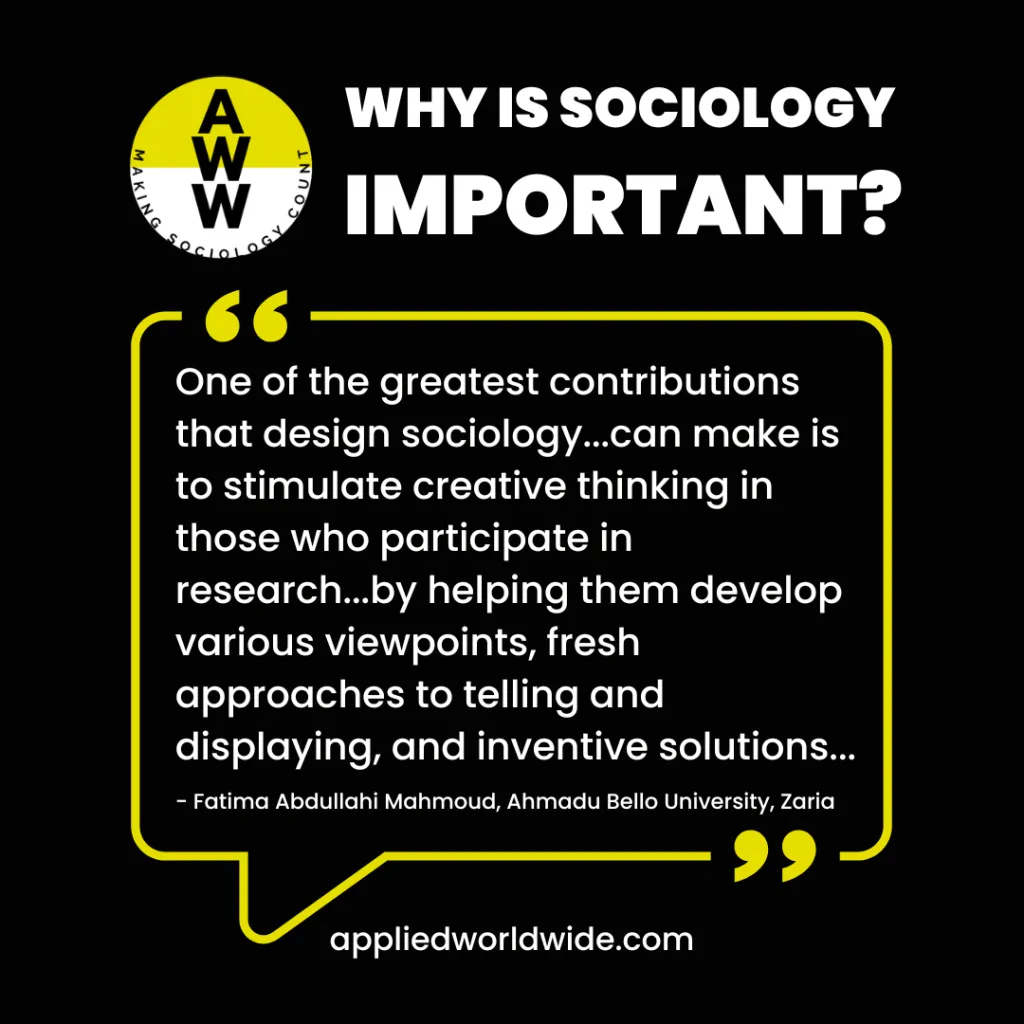
One of the greatest contributions that design sociology, in my opinion, can make is to stimulate creative thinking in those who participate in research—sociologists as well as individuals, groups, or organizations outside of academia—by helping them develop the various viewpoints, fresh approaches to telling and displaying, and inventive solutions that Back alludes to in his vision for live sociology. It will also provide a path for fruitful cross-disciplinary cooperation, allowing sociologists to collaborate with experts in anthropology, design, and other fields, to share and advance their respective fields of knowledge
Conclusion
In summary, I have a better understanding of society structures, human behavior, and the social world, and thanks to my studies in sociology. It has improved my ability to think critically and made me a more knowledgeable Nigerian citizen. I am able to solve societal issues, inspire change in my nation, and provide eye-catching designs for customers by fusing my academic background with my UI/UX design expertise. Being a UI/UX designer and a sociology student has helped me become more conscious of my surroundings and has given me the ability to constructively influence society through instructive and informative designs
Meet our 2023 Global Student Essay Competition Sponsors!
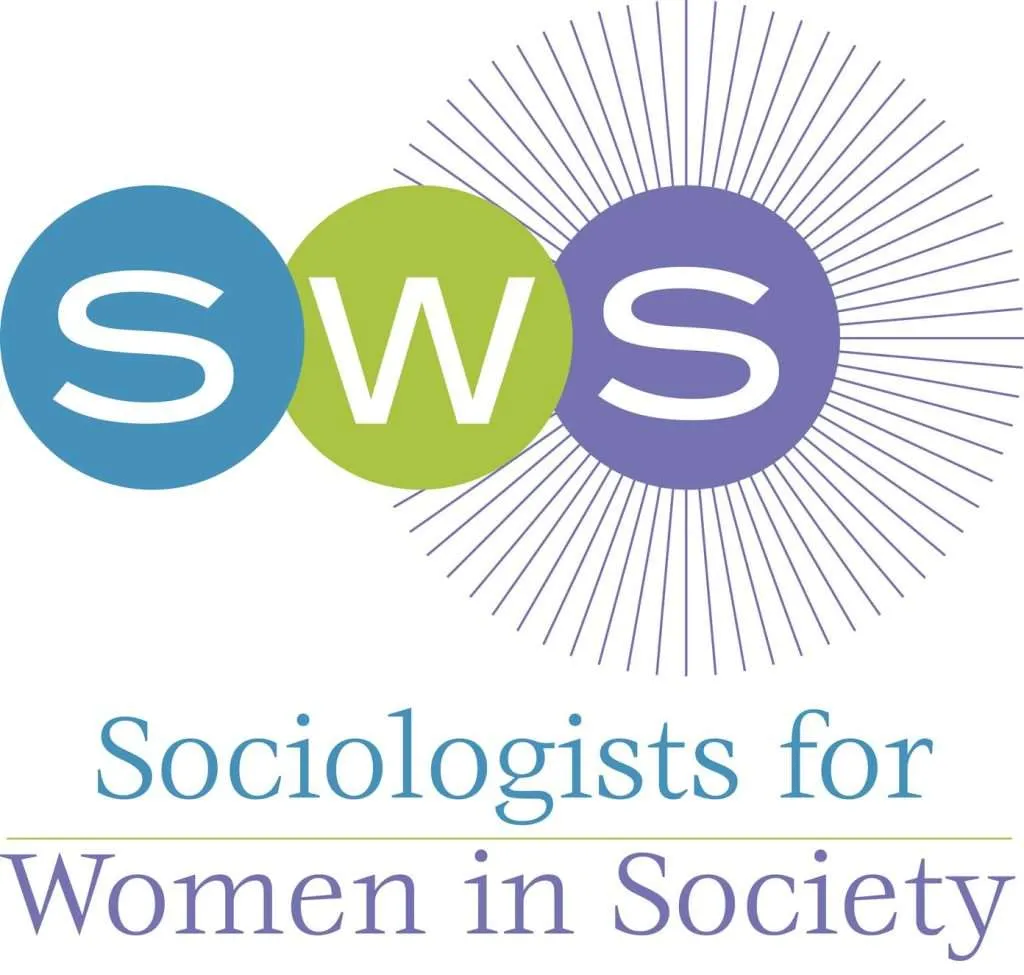
Sociologists for Women in Society is a nonprofit professional feminist organization dedicated to:
- Transforming the academy and professional organizations, including our own, by actively supporting feminist leadership and advancing career development of feminist scholars.
- Recognizing that structural inequalities impact those marginalized by their identities and that this requires proactively promoting the creation of inclusive institutional spaces in an ongoing manner and by practicing critical reflexivity.
- Advocating and encouraging the development of sociological feminist theory rooted in intersectionality and cutting-edge research for publication and dissemination.
- Promoting social justice research within local, national, and international activist spaces by supporting scholar-activist communities seeking to dismantle intersecting systems of oppression.

The Center for Equity Education (CFEE), established in 2020 as a 501(c)(3) nonprofit, addresses a gap in expert-led education for organizations, especially those with limited resources. At CFEE, our mission revolves around empowering organizations with comprehensive knowledge on federal and state civil rights, specializing in harassment and discrimination, including sexual harassment.
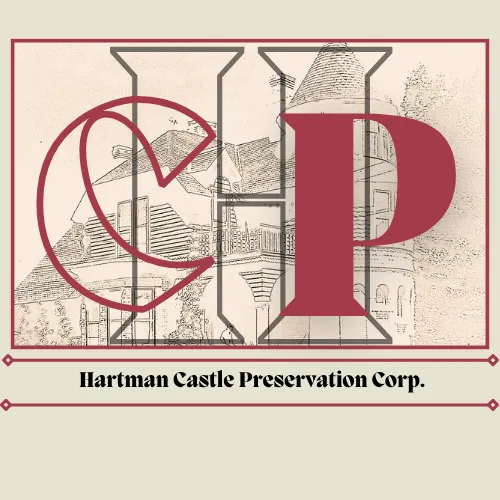
Hartman Castle Preservation Corporation, a 501c3 non-profit, is a A community grassroots movement formed to purchase and preserve the Hartman Castle in Gunnison, CO

The purpose of the American Sociological Association’s Section on Sociological Practice and Public Sociology is to advance sociologically-informed research and practice, to further public discussion of sociological issues, and to promote the use of sociology to inform public policy.

Island Acres Resort Motel is a restored authentic 1950s lodging property in the style of the tourist court motel. Embracing the appeal of a bygone era, where history blends with hospitality.

Alpha Kappa Delta, the International Sociology Honor Society, seeks to acknowledge and promote excellence in the scholarship in the study of social problems, sociology, and intellectual activities that lead to the improvement in the human condition.
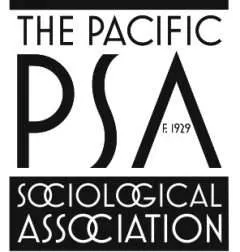
The Pacific Sociological Association is committed to serving sociologists, faculty, applied professionals, and students. We strive to create a professional community that reflects the diversity of our region and enhances the diversity of our discipline. We are committed to inclusivity and equity in our organization, to promoting social justice by examining and challenging the structural and institutional barriers in our discipline, and to building pathways for the next generation of sociologists.

The Association for Applied and Clinical Sociology (AACS) promotes applying social scientific knowledge and methods to develop constructive solutions. We provide educational, programmatic, mentoring, networking, and policy resources in a supportive professional community.







